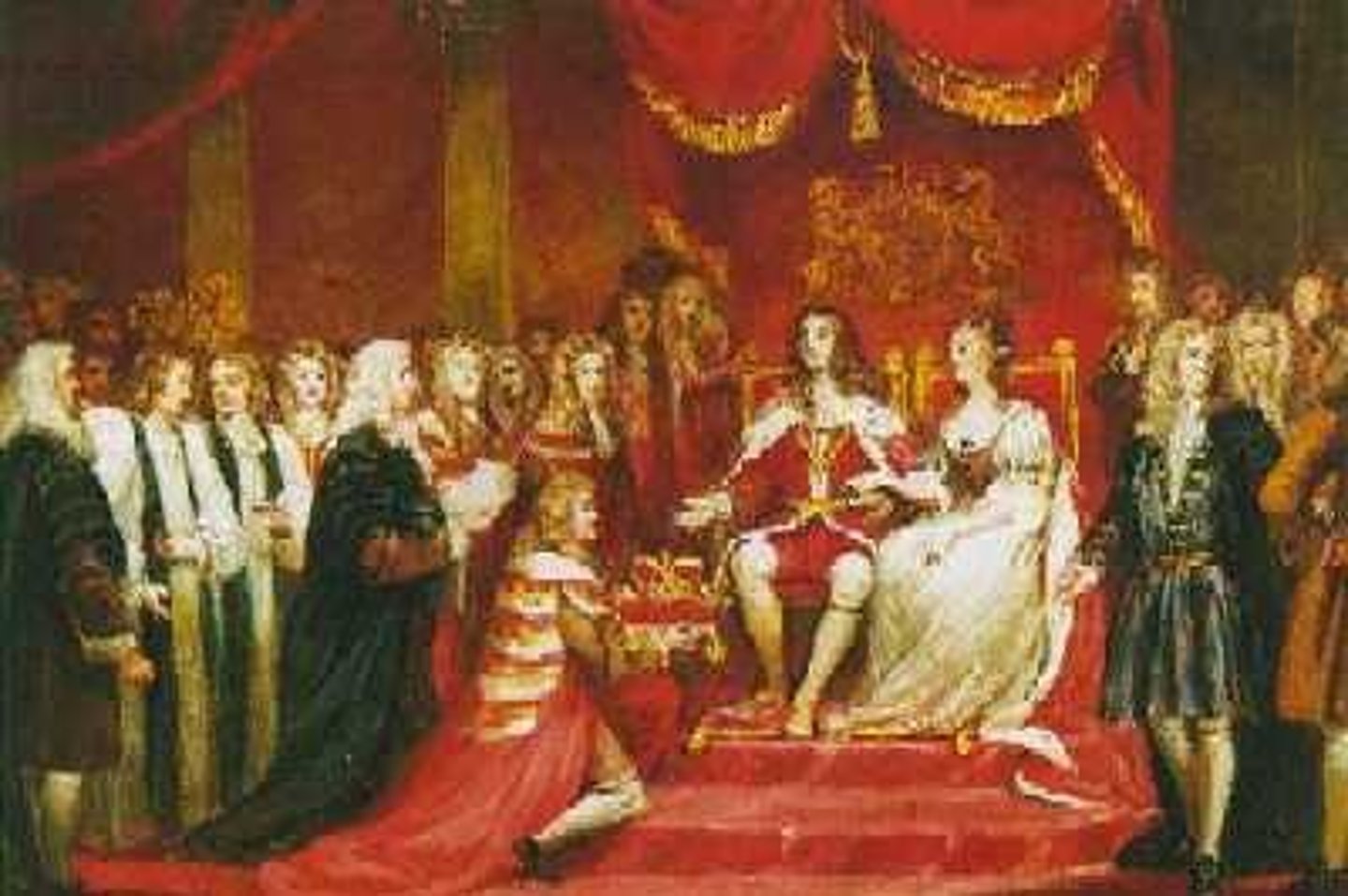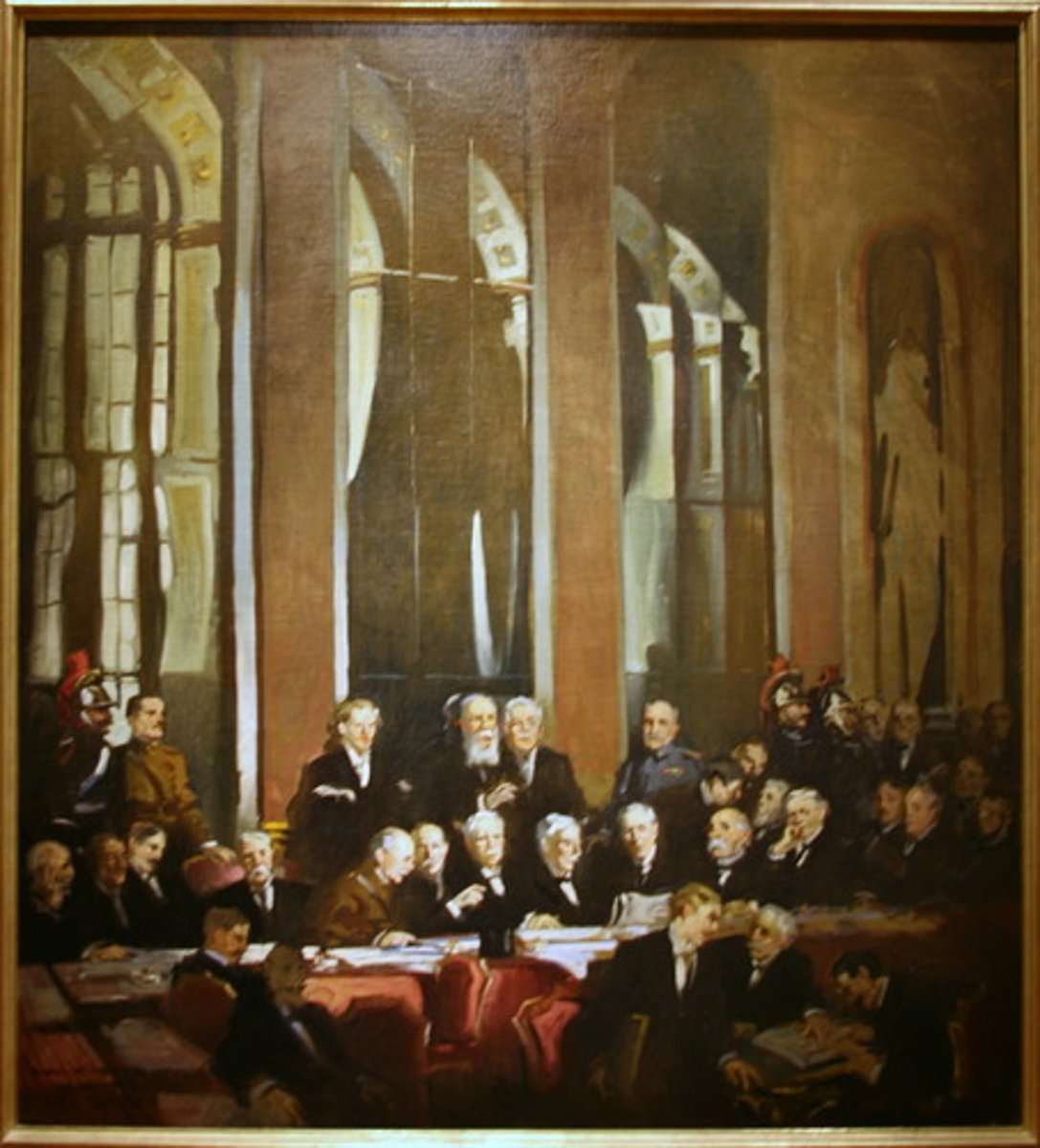Thẻ ghi nhớ: EU history :definition + idk | Quizlet
1/24
There's no tags or description
Looks like no tags are added yet.
Name | Mastery | Learn | Test | Matching | Spaced |
|---|
No study sessions yet.
25 Terms
American Revolution (1775-1783)
- a period during which thirteen colonies separated from England.
- Based on colonists' disapproval with several taxes and poor legislation. After battle in 1775 as a result of protests, the Treaty of Paris was signed in 1777 and 1781 with the capture of the two main British forces and the colonists' alliance with the French.People's rights to representation plus a rebellion against "unjust" rule
→ Two significant previous revolutions that had a global influence and were disseminated through the media, embassies, and commoners
England:
Glorious Revolution 1688-1689
The Glorious Revolution in England (1688-1689) saw the abdication(sự thoái vị) of the Catholic king and the replacement by a Protestant one(người theo đạo Tin lành) due to religious conflicts, breaking the tradition of the "divine right to rule."("quyền cai trị thần thánh")

Locke: Two Treatises of Government 1689
○ 2 Main Ideas:
• No government can be justified by divine right(quyền thiêng liêng), requiring power from the people.
• Legitimate governments(chính phủ hợp pháp) must be founded on the consent of the governed.(sự đồng ý của người dân)
• Social contract theorist justifies the "state." (nhà nước)
• State of Nature: rational man(con người có lý trí) can form government without supreme power.(quyền lực tối cao)
• Civil government founded on popular sovereignty(cơ sở chủ quyền nhân dân): representation from the people/popular vote.
Reasons why France collapse ?
1. economics- financially bankrupt
2. Politics- struggle w/"parlements"
what cause French financial bankrupt ?
- King Louis 14th's mass spending and Spent on Palce of Versailles
- Expensive French campaign in support of USA Revolution (cause they are opposed to England)
- 7 Year War (England/France) = loss of many colonies
- Poor harvest, famine + harsh taxes (to finance wars) + income inequalities
what cause French's politics struggle ?
Provincial parlements(tòa án cấp tỉnh) VS Louis 16th: parlements disagreed w/his decisions + laws
Parlements of France
French noble councils that regulated the legislation of the king and were controlled by the nobles. They greatly reduced the absolute power of the king, and the king was constantly at odds with them and even replaced the parlements with Maupeaou parlements that ultimately failed in an attempt to gain more power over the nobles.

Louis 14th
(Sun King, power from God, the center of the world that everything
else revolves around, center of universe, natural)
Jacques Necker
financial expert of Louis 16th that control the general of finance to deal w/economics harship + help king regain control over economic situation
what did Jacques Necker do ?
The Problem: France was in bad economic shape. There wasn't enough money coming in, but the government was still spending a lot.
Necker's Solution: He took a bold step by making the government's spending public. This transparency was meant to show everyone where the king's money was going.
The Backlash: This plan backfired. People were outraged! Seeing how much the rich and powerful were spending on luxuries while the average person struggled fueled anger towards the elite. Even the king was upset, likely because the public exposure made him look bad.
-> In the end, Necker's attempt to solve the crisis ended up worsen everything by exposure to public
why was Necker being fired by King louis 16th ?
Necker's View on Taxes: Necker believed the nobility and clergy, who were exempt from most taxes, should contribute financially. He felt this was fairer than placing a heavier tax burden on the common people who were already struggling.
Necker's Preferred Solution: Necker thought borrowing money from foreign lenders was a better option than raising taxes on the commoners.
King Louis XVI's Concerns: The King disagreed. He disliked the idea of France being in debt to other countries, fearing it would weaken his power and France's position on the international stage.
Gamble of Louis 16th: 1787-1788
the King made everyone pay the land tax on all land holders (incl. the nobility)
why did the Assembly of Notables happened ?
The nobility didn't accept the land tax that they used to dont have to pay and they rejected the kING'S proposal
What did the king do inorder to deal with the Assembly of Notables ?
The king once again held a meeting of the Estate-General to bypass the rejection from the nobilities
what's the Acien Regime in France ?
a social and political system that existed before the French Revolution, ruled by the King 's Divine power & right : the king belived his right to rule came directly from God, making him answerable to God, but not the people
what are the France's challenges during Acien Regime ?
- Population boom (more people need to be feed & govern, putting a strain on the resources)
- Major of ppl live in the rural/countryside (most of them are farmers, relying on outdated farming methods that couldnt keep up with the fast growing population increase)
- Land Fragmentation/Land division (land being divided into smaller plots, making farming less efficient. Big plots which are efficient in farming were rare)
- Geographic Issues: the uneven (không đồng đều) ownership of inherited land (Đất đai được thừa kế) made resource bt became more difficult.
- Food Shortages: Poor harvests, harsh winters, and floods led to food shortages, especially in cities. This drove up bread prices, a vital food for the poor.
How These Issues Contributed to Revolution
- the Divine Right of KIngs made the system inflexible to change and it made the problem grew bigger
- the rising population and inefficient farming created food scarcity
- the poor commoners became restless and unable to feed themselves
- all of these combine with the resentment/dissatisfaction towards the clergy and nobility in the privileged 1st and 2nd estates while the 3rd estates haved to endured all those things
The King's Power
Divine Right: The core belief was that the King's authority came directly from God, making him the ultimate ruler.
Limits to the king's power
- moral and divine laws: the king was expected to rule justly and in accordance with God's will, eventhough these laws havent been written
- customes and principles: The king's total freedom of action was constrained by unwritten customes nad conventional wisdom
- king's council: This advisory body was supposed to offer advice and potentially challenge the King's decisions (though in reality, they often just agreed with him).
The Challenge of the Parlements
- Droit de Remontrance: Parlements, which were regional courts, had the right to "remonstrate" or appeal against ("tái thẩm" hoặc kháng cáo) the King's edicts (sắc lệnh)
- Limited Representation: some elected members from nobles, clergy, commoners, representing a form of limited public voice (đại diện cho một dạng tiếng nói hạn chế của công chúng)
- Uneven Power (Quyền lực không đồng đều): There were 13 parliaments, but the Paris Parlement was the most critical (chỉ trích) of the King's actions.
King's Response to the Parlements's challenge: How did his respones impact the Parliaments ?
- Weakening Appeals: Louis XIV banned any disrespectful challenges to his authority and limited the right to appeal.
- "Flagellation" Speech: Louis XV reminded the parliaments of his divine right and limited their appeals to a single case with a brief wait. (kháng cáo của họ vào một trường hợp duy nhất trong thời gian chờ đợi ngắn.)
- "Coup de Majeste" (1771): With the goal of creating a more regulated legal system, this reform further limited appeals.
Louis XVI's Dilemma (Thế tiến thoái lưỡng nan của Louis XVI:) what did Louis XVI do and what happen to him ?
- Restored Appeals: In an attempt to be popular, Louis XVI restored the ability to appeal .
- Backfired: Parliaments heavily utilized this to severely weakening his power.
Absolute Rule
- No Constitution: Unlike some countries today, France didn't have a written document outlining the government's structure and limitations.
- Divine Right: The King believed his power came from God, making him unaccountable to any other authority.
Challenges to Uniformity (Những thách thức đối với su đồng nhất)
- Legal Pluralism: Different regions had their own customary laws alongside written laws, creating a messy patchwork legal system across France.
- Implementation Variations: Depending on the location, even written laws may be understood and applied differently.
Centralizing Power (Tập trung quyền lực:)
- Intendancy System: The King set up a network of intendants to get around these contradictions and impose his rule across all of France.
- King's Appointees: The King personally selected these officers, guaranteeing their devotion, as opposed to being hereditary nobles.
- Broad control: Intendants effectively combined the power of the legislative, executive, and judicial branches in their area, having wide control over justice, finances, and law enforcement.